|
How Much Of All Your Happiness Have I Really Claimed?
For a teenager in 1958 $3.98 is not a trifling amount of money to spend on a single purchase. Your tastes in most things, movies, magazines, cars and girls, seemingly change by the minute. What you liked yesterday you're likely to forget by tomorrow, or at least that's what your mother is constantly saying. You can't stick with anything for very long. That Charles Atlas workout routine you sent away for last month so you can be muscle bound by the summer to look good on the beach lasted all of a weekend before you became resigned to being a scrawny kid who looks no different than everyone else your age. The girl you had the crush on in Algebra class this past fall, the one you plotted to talk to for weeks on end before finally getting the courage to even say hello, has been replaced in your heart by a girl in your History class who you now swear will be your future wife and the mother of your children by 1964. But next week she'll be history too, as some yet to be determined beauty in English class will catch your eye and be proclaimed as the future Mrs. So-and-so. Pity the poor girl. And God help us all when next year the hula-hoop becomes a national craze and your hips join the rest of the hips in your class in learning the challenging skill of keeping that silly plastic tube rotating endlessly around your midsection... at least until you get your driver's license a few months later and leave such childlike diversions behind. So given that your passing interests pass at such a astonishing rate do you really think spending a good chunk of the money you earned in hours of arduous labor mowing lawns or shoveling sidewalks over the past twelve months on a long playing record is a sound investment? Is this LP destined to become another monument to impulse buying that will be cluttering the floor of your bedroom closet alongside your coonskin cap, glow-in-the-dark yo-yo and old issues of MAD magazines? Don't forget, you'll need to save room in there for the hula hoop soon anyway. Your allowance is just 25 cents a week. That's four months of allowances, kid. If you keep spending money that recklessly then at the end of the year all you'll have to show for 1958 are three long playing records that you never listen to anymore and an empty wallet. Besides, LP's are for adults. They're what old people listen to when they finally put the kids to bed and are doing all the fun parenting things the color brochures rave about, like washing dishes, reading newspapers and arguing over the children's behavior. Albums are for listening to Frank Sinatra, Nat "King" Cole and Harry Belafonte. They're for Broadway shows and Christmas carols. They aren't for kids and they SURE aren't for rock 'n' roll!
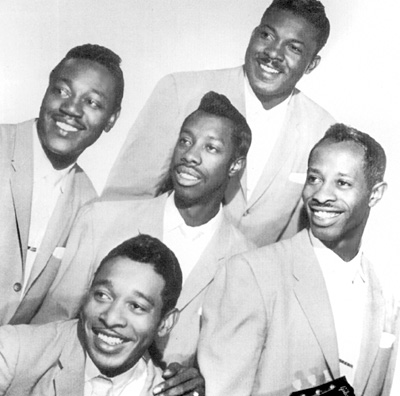
Rock music is about singles. One song, if you're lucky two good ones, on a 45 RPM disc for less than a buck. You can scrounge up the change for those in the couch cushions and when you buy one of them you'll be sure you're getting the song you WANT, not a bunch of songs by the same artist thrown together around the one or two you may recognize, or heck, already have on singles you bought months before. What's the point of this anyway? To get an album cover with a picture of the artist on it?!? Half the time they don't even have their own picture on the cover anyway, they'll put some sappy looking girl on it, or a bland shot of something unrelated to the music altogether. I suppose if you're a girl and you want a picture of Elvis Presley or Ricky Nelson then spending almost four bucks on an LP might be more understandable, but not for you! All you care about is the music! The sounds on that record. But twelve songs? All by the same group?? One after another??? Isn't that overkill???? Is this just some ploy to get my money?!??!?!? Surely you can pass on such a dubious offer. Keep that money. Spend it on candy, comic books and slingshots. If you save enough of it then next year, after you blow some on that hula-hoop contraption, you can start spending it on gas, cigarettes, booze and girls... you know, IMPORTANT things. Besides, the car will have a radio and the radio plays music for free. It's just music after all. There's new songs coming out each and every week. One song, one album, one artist, more or less, won't change your life all that much. Keep your album, you say with confidence, and I'll keep my $3.98.
I Believe I'd Better Make A Move
The five faces adorning the album cover you hold in your hands at the record store look out at you with a hint of playful devilment in their smiles, as if they're the sole possessors of untold secrets they want to share with you. They are older black faces, unrecognizable to all but the most fervent rock fan by early 1958, but they seem to speak to you telepathically, urging you to give into your curiosity and take them home. The steely resolve you had entered the store with, the one which told you not to blow your dough on such a risky venture, has already begun to erode. The group's name might not hold that much interest to the average teenage record buyer of the day, their renown having faded to the point where they've become all but unrecognizable figures in the rock landscape of early 1958, but something about the album beckons to you.
The "5" Royales were in rock 'n' roll almost from the dawn of its very existence and along the way became the originators of soul music. Before Ray Charles switched from doing light cocktail blues, before Sam Cooke left his own gospel group for rock stardom, before James Brown was released from prison for the transgressions of a wayward youth, there was this aggregation of singers from North Carolina who erased the long-held line of demarcation between the heavenly and the hellacious. They began years earlier as a teenage gospel group, The Royal Sons Quintet, and eventually signed with Apollo Records in 1951 to record in that field. Their early gospel offerings were raw and brilliant but there was no real market for them so, facing a desultory future of working in the tobacco fields should their music career end now, what the hell, why not try making rock records while you're at it? They didn't know quite how to do that however so they simply added secular, and oftentimes raunchy, lyrics to gospel melodies thereby corrupting the consecrated soul while feeding the earthly soul. But hey, what was a little harmless sin in the big picture of things anyway? Audiences agreed, making the newly christened "5" Royales the most popular rock group in music for 1953 when they topped the R&B Charts with two all-time classics, "Baby, Don't Do It" and "Help Me Somebody", and notched two other Top Five hits that same year. Ahh, but sin has a way of making payback a bitch and within a year they were paying for their moral high crimes and misdemeanors. First they had to battle a new up and coming group calling themselves The Royals for ownership of their all-too similar names (for the record, The "5" Royales was pronounced Roy-AHLS, not ROY-uls, but fans of this type of scandalous music hadn't bothered to pay attention in English class anyway, had they even showed up there at all). The aforementioned Royals were ultimately forced to change their name to The Midnighters but had the last laugh when they promptly stole the spotlight from their older brethren with the most scandalous song to come along in years, "Work With Me, Annie", which topped the charts in early 1954. Meanwhile, The "5" Royales grew frustrated with their one-sided contract with Apollo Records who they felt didn't have the promotional muscle to spread their fame to the desired levels that all rock stars assume is their birthright and so they jumped ship and went to the more powerful King Records. In legal terms however this is referred to as breach of contract and is frowned upon by the courts where the battle ended up. In practical terms it was a doubly-hard pill to swallow because King Records was home to none other than their previous legal nemesis, The Midnighters, who on the basis of their succession of ribald "Annie" songs had overtaken The "5" Royales as the biggest rock group in the land and would receive the greater share of their promotional efforts from the label the "5" Royales had just landed at. When the dust finally cleared and the group was allowed to record for King their momentum had stalled and compounding their problems was the unexpected fact that the latest generation of rock fans were younger, whiter and further removed from gospel upbringings than the audiences which had propelled The "5" Royales to stardom just a few short years earlier.
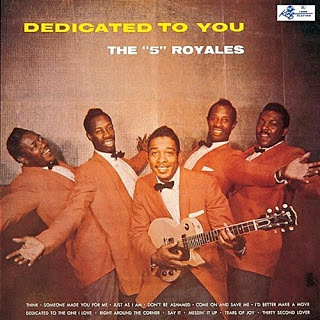
Though the quality and diversity of their output at King Records was even better than their stint with Apollo, their sales plummeted. 1954 and 1955 saw the crossover of rock to white audiences begin with the rise in popularity of smoother and younger vocal harmony groups, later dubbed doo wop. 1956 was the year of Elvis Presley and other southern white rockabilly acts who started shifting the music into a new demographic reality. By 1957 The "5" Royales hadn't had a national hit since early 1954, an eternity in rock 'n' roll, and King Records was doing just fine without any notable contributions from them. The Midnighters had been joined by the likes of Little Willie John, Bill Doggett, James Brown and The Charms, all whom scored hits for the King label since the group's arrival and as a result The "5" Royales time as viable artists seemed just about ready to expire.
Someone just forgot to tell them though.
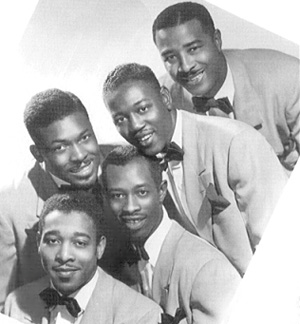
Top to bottom: Otto Jeffries, Jimmy Moore, Obadiah Carter, Johnny Tanner, Lowman Pauling
Can't Get You Out Of My Mind
Group leader Lowman Pauling wrote the songs, sang the baritone or bass parts and played lead guitar, an instrument that he began to feature more prominently in the band's arrangements since their arrival at King Records. The vocals were handled by one of two brothers, Johnny Tanner, the usual lead, or Eugene. The singing was rounded out by Jimmy Moore and Obadiah Carter. When Pauling stopped recycling the old gospel frameworks they'd relied on while at Apollo their material became cutting edge compared to most of their contemporaries. The close street corner harmonies of doo wop and its reliance on the youthful tenors or boy-sopranos singing uptempo ditties may have captured the ears of a generation coming of age in the mid-50's, sounding as it did to their virgin ears like wonderfully unintelligible communication from an alien species that offered the promise of life's eternal truths, but the "5" Royales more earthly gospel-derived harmonies were the bedrock of something even more essential. While guitarists like Scotty Moore and Chuck Berry were perhaps the most recognizable of the new guard in rock, the true axe-connoisseurs sought out the likes of Bo Diddley, Mickey Baker, Cliff Gallup and Pauling, whose single-string solos were sharp enough to draw blood. The new lyrical focus in much of rock music was now centered on high school concerns such as cars, dancing and going to drive-in movies with girls who wouldn't dare allow a hand to slip under their sweaters, let alone their bras, on a Saturday night date, an unwelcome concession to keep the censors at bay. By contrast Pauling's lyrics were from the perspective of those who woke up Sunday mornings broke, hung over, and with a girl whose name they might not even remember lying naked alongside them, abortion pending. In other words, it was everything your parents warned you about, wrapped into two and a half minutes of musical ecstasy.
Your mind is made up. Three dollars and ninety eight cents or not, you have to have it. To hell with buying your own car next year, you'll take the bus. When you get it home, you hastily close the door to your bedroom, take a long swig from the bottle pulled from the back of your sock drawer, and put the record on the turntable. Sprawled on your bed you look again at the album cover, focusing now on Pauling out in front, his low slung guitar held like a machine gun, and wonder what it'd be like to become the embodiment of that image yourself someday. The picture of unspoken cool. If so, you wouldn't be the only one. Writer Greil Marcus once emphatically stated that Eric Clapton would've paid money just to hold Pauling's coat. At that very moment a half a world away on a bed in dreary England, 13 year old Eric has somehow gotten hold of the same album and was dreaming that same dream. You drop the needle into the groove and close your eyes, the whiskey you smuggled in your room going straight to your head, smoke from the cigarettes swiped from your old man wafting out the open window and the sounds of a group that none of your friends have probably ever heard OF, let alone heard their music, filling the room. You already know that in years to come, if you're not in jail or living in some wayward Mexican town on the coast with a brown-skinned beauty who doesn't understand more than a few vulgar words you exchange during sex, that you'll be on a stage in front of thousands of screaming kids, your own guitar held in Pauling's characteristic gunslinger pose, playing riffs that originated from songs those kids never heard, taken from an album they never knew existed.
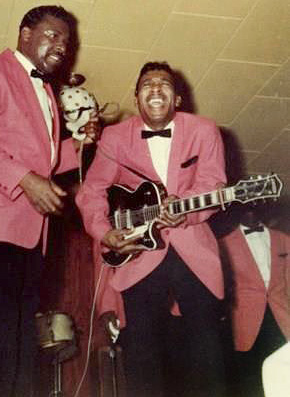
It's Something That Everybody Needs
The first word you hear coming out of the speakers is a simple one syllable command - "Think!". About what though? The fact that it was their first legitimate hit single in many moons? The logic of your decision to spend nearly four bucks for an entire album to get that one hit you may have already have spent 98 cents on by itself a few months back and what else you could've bought with such a small fortune instead of this LP? About the chances the Soviet satellite Sputnik took pictures from space of your illicit activities with Gloria Vanderhopp which the KGB is pouring over as we speak? Then comes a hint. Pauling's guitar response, an otherworldly explosion of sounds, twisted and distorted beyond normal melodic conventions. Ahhh, so THAT'S what they want you thinking about. The future of rock 'n' roll and how the electric guitar is poised to take an increasingly prominent role in shaping what you hear from now on. Just to be sure you understand their point they say it again - "think!" - and again Pauling answers, choosing different notes, but played with the same strangled intensity as before. Then, just for good measure, they offer it up one more time, in case anyone's mind had wandered for even a moment. After such a startling introduction it's a safe bet that it won't wander again. Welcome to the new frontier in rock 'n' roll music. A world where vocals now have something equally arresting with which to share the aural spotlight. Rock had featured increasingly prominent electric guitars for awhile by now but with "Think" Pauling makes sure that it gets equal billing. Each word, or line, is immediately answered by another biting, completely original, lick. They have the effect of sticking a fork in a live electrical socket... repeatedly. Lead singer Johnny Tanner tries swaying your attention back to him as he implores you to listen to his declarations of true devotion offered to a departing lover. His pleas are heartfelt, honest and logical. "Think about good things that I've done for you/think about the bad things I tried not to do". But no matter how sincerely he offers them they are lost amidst the guitar's wicked retorts. Is it the girl's scoffing disdain offered up by her surrogate voice symbolized by the six strings of Pauling's Gibson guitar? Maybe, but it doesn't even matter, because as well crafted as the lyrics Tanner sings are, the sentiments are overwhelmed by the ferocity of the new king of the rock 'n' roll jungle. By the time the song winds down the only thing you're thinking is, "Can I hear more of that?"
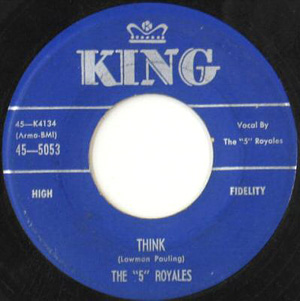
Not yet. As the guitar pyrotechnics of "Think" have you eager for more of the same, The "5" Royales smartly let you breathe for a few minutes by reverting to a more traditionally structured song, devoid of futuristic mind-blowing guitar work. Whereas "Think" had a chorus that wasn't so much sung as stated emphatically, answered with more guitar arrows that pierced your ears, the second track, "Someone Made You For Me" replaces Pauling's guitar with sessionist Bill Doggett subdued organ. The ballad puts to good use the group's tight wordless harmonies behind Tanner's restrained lead. With their open throated "ahhs" in the chorus, the hum of the church like organ, and a delicate rim shots on the drums, along with the lyrical references to God's view on romantic love, the song veers as close to gospel as anything the group had done in years. It would've made for a great album closer, or the sign off song for an otherwise raucous radio show around two in the morning, to send everyone home in a transformed state of mind. But here, they're not that thoughtful, for it's only a momentary pause before they grab you by the throat and drag you back under the spell of Pauling's searing guitar. "Just As I Am" features it sparingly, but no less effectively, than the album opener. Pauling's greatest attribute, aside from his visionary talent, was his restraint. It's no wonder that future Booker T. & The MG's guitar legend Steve Cropper was so drawn to him, calling him his "total inspiration". Both intuitively knew that less can definitely be more and here Pauling opens with a quick run before fading into the background, only to make brief reappearances that suck you back in every so often when space allows for it. Tanner meanwhile, perhaps relieved to be free of the strict competition of his showy group mate, delivers one of his best vocals, another pleading declaration of his love, replete with acapella cries where he transforms the pronoun "I" into five tortured syllables of longing. But any thought that Pauling would continue to simply lay back in the shadows is shattered with the intro to "Don't Be Ashamed" where he rips into another of his patented single-string assaults on the senses. The uptempo stomp features the first sighting of a strange buzzing electric bass, something that would become a trademark of the album and a massively influential trait that would reach full-flower nearly a decade later. The near shouted group vocals on the chorus are done out of sheer necessity to be heard amidst the instrumental blitzkrieg that threatens to overtake the proceedings. When the tenor sax, rather than the guitar, plays a solo in the break one gets the impression it was simply done to allow everyone to exhale again before being dragged back under for the closing refrains of Pauling's lethal guitar. Menacing doesn't begin to describe the effect it all has on your state of mind before the upbeat refrain of the final chorus releases the pressure one last time.
Surely all of this left a good many kids feeling emotionally battered at this point, for while the music was as melodic and skillfully sung as anything else on the rock 'n' roll airwaves for 1958, the method of delivery it employed was far more powerful. If they hadn't turned off their record player and scurried under their bed in fear they got a sympathetic respite with what followed. "Come On And Save Me", an apt title as ever offered under the circumstances. Pauling defers to the piano and horns, both of which take restrained supporting roles, while the vocals return to the forefront. Though even here Tanner's spoken intro includes the declaration that as distraught as he's feeling he might just kill himself, so it's safe to say that even when they're releasing the instrumental pressure they're not completely eviscerating the intensity. The group's reassuring chanting of the title line in the choruses however may just convince you that the worst of the onslaught is now over and you can stop clutching your pillow. "I'd Better Make a Move" reinforces that belief. Pauling's guitar is omni-present, but like a poisonous snake leisurely sunning itself on the patio, its mere presence is more threatening than its actions in this case. He plays supporting fills, sharp as always, impressive nimble-fingered runs, but he defers to Tanner's emotional lead and the rest of the group's breathy vocal support. So ends side one, back when records needed to be flipped over to hear the second half. Following that subdued closing tandem to the first side you just might take the risk of listening to the second half without feeling the need to arm yourself first, or at least turn the lights on as the sun starts to set outside your bedroom window.
If so, you'll soon regret your bravery. Pauling is lying in wait for you as side two opens with a vengeance.
For years, if anyone had a glimmer of recognition should they hear the name The "5" Royales, it was likely because of their original recording of the rock chestnut "Dedicated To The One I Love", which shortly after The Shirelles would take to the top three on the pop charts with a restrained, more dreamy cover version, and then a decade after Pauling and company first recorded it The Mama's and Papa's would score a massive hit as well with a remake that was angelic in comparison to the original. In the hands of its creators though "Dedicated" borders on yet to be invented hard-rock and the combination of Eugene Tanner gospel-drenched vocals, taking his brother's place on lead, the most prominent example of fuzz bass recorded in the 50's and Pauling's scintillating guitar attack makes for a concoction that could get the most sober of angels drunk on the power of the music. The acapella opening leads into a group vocal intro before plunging headlong into the main section as the bass positively vibrates with intensity and Pauling's guitar lines have the chilling effect of seeing the flash of a switchblade in a dark alley after midnight. Somebody's sure to get hurt here, but as you listen closer you see the lyrics are uplifting, offering a vow of everlasting devotion that indicate what the more famous cover versions saw in this tune to begin with. It's as tender and sincere a sentiment as has ever been offered in a rock song but it's presented with such a dangerous allure that it becomes downright erotic in nature. Soul music has always been, at its core, a sacred feel delivering a secular message, but here Pauling and company turn that inside out offering an almost sacred creed with a secular feel from the other side of the tracks. To call the song a masterpiece doesn't do it justice. It's beyond that.
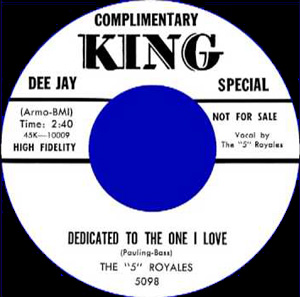
Tensions ease momentarily with "Right Around The Corner", a more typical piano led uptempo romp with the group offering nonsensical backing vocals to Johnny Tanner's lead delivering vaguely suggestive lyrics implying various ways he can get to his baby, whether that means her house as he suggests, or get to her physically, as is implied in the potentially double-entendre filled lyrics. The sax solo is crisp, concise and non-threatening, but its relative tranquility in comparison to much of what you've already heard only serves as a reminder as to what dangers really lie right around the corner on the album itself.
The first notes of Pauling's stinging guitar on "Say It" drags you back in the alley, slicing you open and leaving you gasping for air. It's one thing for songs to be despondent but this is suicidal in its intensity. The premonition of an impending breakup provides the lyrical setting, with Tanner's mournful vocal all but powerless to stop his heartbreak. But it's Pauling who reflects the singer's true anguish, ripping off a series of vicious licks that pour salt in the wounds, a musical masochist cutting deeper into the flesh with each note, building intensity until it becomes unbearable. One listen to the ferocious descending run he closes the song with will surely have you in need of a tourniquet to stop yourself from bleeding to death. No guitarist in 1958 was playing this fiercely. It was nearly demonic in its precision and power, ripping through the speakers like jagged glass until they're laid to waste. You all but expect to hear sirens in the distance when this savage musical ambush is over.
If there was a stab at commercial viability found within the album it was surely "Messin' Up". Uptempo, perfect for dancing, featuring a relentless groove with a paint peeling sax solo and Pauling's guitar darting in an out of the verses, it's two minutes and 41 seconds of unhinged cacophony. In fact, it's so torrid that it's unlikely anyone would even notice the lyrics are downbeat and full of despair over another romance gone awry. Actually, the first song included on Dedicated To You to chart on its own was "Tears Of Joy", which in terms of architecture is worthy of Frank Lloyd Wright. The slow burn guitar riff that opens it is followed by breathless harmony singing. The two entities trade off, building the tension until Eugene Tanner's lead bursts through 17 seconds in, backed by the group's wordless cries and insistent piano triplets, even a comparatively subdued Pauling riff in the bridge. While it may be standard doo wop construction on the surface, the type that had resulted in countless hits for others over the past four years, the materials they use for their sculpture elevate it to high art.
But any thought that Pauling would you let you leave without exhibiting his prowess on guitar one more time goes out the window with the album's closer, "Thirty Second Lover". Though he doesn't annihilate the instrument as he had earlier, he flashes the cleanest licks of the album during multiple instrumental passages, sharp and precise enough to cut diamonds. The vocals trail off with the refrain "Can't get you off of my mind" as Pauling's guitar echoes ominously in the fade, leaving no doubt what will remain on your mind as you go to sleep that night... provided you can sleep at all after hearing such a chilling tour de force.
But as you fade off into the hazy netherworld of your dreams, the effect of the booze and the music taking their considerable toll, you consider how you just spent four whole dollars on a lone album leaving you with all of 37 cents as your life savings, but have no doubt that it was well worth it. Those four bucks just let you see into the future and discover what all of rock 'n' roll has in store down the road, something it will take the rest of society a decade or more to realize for themselves.
What of The "5" Royales? Well, they wouldn't get to share in the glory. Their take of that 4 dollar charge for such a priceless gift was 12 cents, divided five ways, and that's before taxes. It doesn't always pay to be ahead of your time, but that doesn't mean you can't profit from this unholy bargain yourself by listening to it over and over again until you're a unclaimed corpse lying on a slab in a morgue somewhere. The coroner will stare quizzically at your grisly remains, stabbed to death by a sharpened guitar pick or strangled with a guitar string, yet with a wicked, all-knowing smile frozen onto your face and a copy of Dedicated To You clutched in your cold, lifeless hands awaiting the moment you're both lowered into the ground and forgotten forever.
|